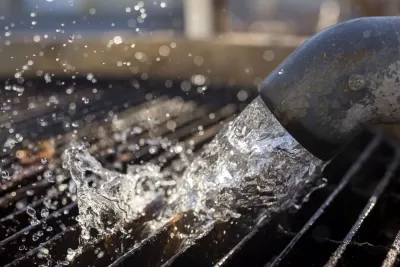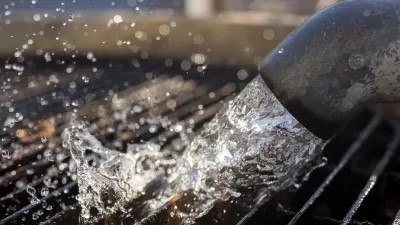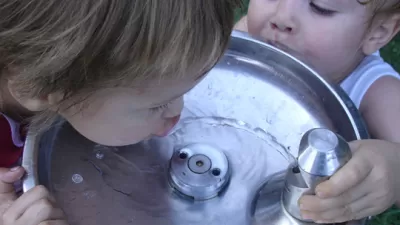The ambitious Pure Water project is designed to reduce the city's dependence on imported water and limit the amount of sewage dumped into the ocean.

After "a lengthy process featuring thorny lawsuits, complex labor deals and an aggressive public education campaign to fight the derogatory early nickname 'toilet to tap,'" San Diego has launched its biggest-ever infrastructure project, "a sewage recycling system that will boost local water independence in the face of more severe droughts caused by climate change." As David Garrick reports, "this fall will mark the start of construction on the system’s three most essential projects," "a $356 million sewage purification plant in western Miramar, a $123 million pipeline through much of Clairemont that will bring sewage to that plant, and a $110 million Morena Boulevard pump station to make that possible."
In response to protests by local residents who worry about disruptions to their neighborhoods, the city "created special 'working groups' to keep residents up to speed on activity." The project, named Pure Water, "will produce 34 million gallons per day of potable drinking water. A larger second phase, slated for completion in 2035, will add another 53 million gallons," reducing San Diego's imported water from 85 percent to under 50 percent.
"In addition to making San Diego’s economy less vulnerable to droughts and sharp cost increases for imported water, the project also will sharply reduce the amount of sewage the Point Loma Wastewater Treatment Plant emits into the ocean," an important selling point since the city faced "constant pressure from federal officials to spend billions upgrading the Point Loma plant to meet the standards of the Clean Water Act."
The project is also expected to provide 4,800 jobs through "a union-friendly Project Labor Agreement," the first in the city's history.
Los Angeles, Orange County, and other local governments across California are implementing their own water recycling projects in a bid to reduce Southern California's water imports and boost the state's water security as it prepares for intensifying climate change and deeper drought.
FULL STORY: San Diego launching Pure Water, largest infrastructure project in city’s history

Planetizen Federal Action Tracker
A weekly monitor of how Trump’s orders and actions are impacting planners and planning in America.

Congressman Proposes Bill to Rename DC Metro “Trump Train”
The Make Autorail Great Again Act would withhold federal funding to the system until the Washington Metropolitan Area Transit Authority (WMATA), rebrands as the Washington Metropolitan Authority for Greater Access (WMAGA).

The Simple Legislative Tool Transforming Vacant Downtowns
In California, Michigan and Georgia, an easy win is bringing dollars — and delight — back to city centers.

Albuquerque’s Microtransit: A Planner’s Answer to Food Access Gaps
New microtransit vans in Albuquerque aim to close food access gaps by linking low-income areas to grocery stores, cutting travel times by 30 percent and offering planners a scalable model for equity-focused transit.

This City Will Pay You to Meet Your Neighbors
A North Kansas City grant program offers up to $400 for residents to throw neighborhood block parties.

Commentary: Our Silence Will Not Protect Us
Keeping our heads down and our language inoffensive is not the right response to the times we’re in. Solidarity and courage is.
Urban Design for Planners 1: Software Tools
This six-course series explores essential urban design concepts using open source software and equips planners with the tools they need to participate fully in the urban design process.
Planning for Universal Design
Learn the tools for implementing Universal Design in planning regulations.
Smith Gee Studio
City of Charlotte
City of Camden Redevelopment Agency
City of Astoria
Transportation Research & Education Center (TREC) at Portland State University
US High Speed Rail Association
City of Camden Redevelopment Agency
Municipality of Princeton (NJ)




























